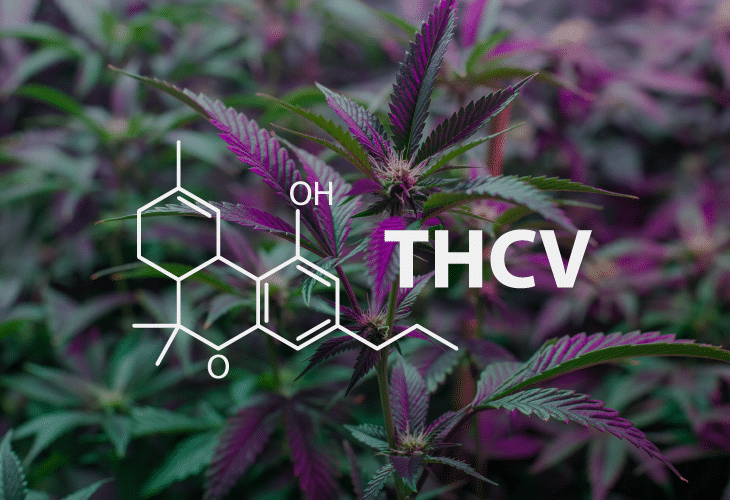The world of cannabis is evolving, and with it comes a growing interest in lesser-known cannabinoids like tetrahydrocannabivarin (THCv). Unlike its more famous cousin, THC, which is notorious for sparking the munchies, THCv is gaining attention for its potential to do the opposite: support weight loss. As obesity rates climb—over 40% of adults in the U.S. were classified as obese in 2020, according to the CDC—people are searching for novel tools to manage weight. Could THCv, a compound found in certain cannabis strains, be a game-changer? This blog post explores the science behind THCv, its potential for weight loss, and how dosing plays a critical role, all grounded in current research and data.
Understanding THCv: The Skinny Cannabinoid
Tetrahydrocannabivarin, or THCv, is a cannabinoid found in some cannabis varieties, particularly African sativas like Durban Poison. Structurally similar to THC, it interacts with the body’s endocannabinoid system but produces distinct effects. While THC binds strongly to CB1 receptors in the brain, triggering appetite and euphoria, THCv acts as a CB1 receptor antagonist at low doses, potentially suppressing appetite. This unique mechanism has sparked interest in its role for weight management. A 2016 study in the Journal of Psychopharmacology noted that THCv could reduce food intake in animal models, hinting at its potential to curb cravings in humans. Beyond appetite, THCv may also influence metabolism, making it a dual-action candidate for weight loss.
The Science of Weight Loss and THCv
Weight loss boils down to a simple equation: calories in versus calories out. However, the body’s metabolic processes, appetite regulation, and fat storage mechanisms complicate this balance. THCv appears to interact with these systems in promising ways. Research from the British Journal of Pharmacology in 2013 showed that THCv increased energy expenditure in mice, suggesting it may boost metabolism. Another study, published in Nutrition & Diabetes in 2016, found that THCv improved insulin sensitivity and reduced fat accumulation in obese mice. These findings are significant because insulin resistance and excess fat storage are key drivers of weight gain in humans. While human studies are limited, early data suggest THCv could help regulate blood sugar and reduce body fat, offering a novel approach to weight management.
Dosing THCv: Finding the Sweet Spot
Dosing is where the rubber meets the road with THCv. Unlike THC, which has a well-established dosing range, THCv is less studied, and optimal doses for weight loss are still being explored. Current evidence suggests that low to moderate doses—typically 5 to 10 mg per day—may be effective for appetite suppression without causing psychoactive effects. A 2020 clinical trial in Cannabis and Cannabinoid Research tested 10 mg of THCv daily in humans and found reduced hunger and improved glucose metabolism in participants with type 2 diabetes. Higher doses, however, can flip THCv’s effects, acting as a CB1 agonist and potentially increasing appetite, similar to THC. This biphasic effect underscores the importance of precision in dosing. Start low, monitor effects, and adjust cautiously—this is the mantra for THCv use.
Delivery Methods: How to Take THCv
How you consume THCv matters as much as the dose. Common delivery methods include oral capsules, tinctures, and vaping. Each has its pros and cons. Oral capsules, like those used in clinical trials, offer consistent dosing and long-lasting effects but take 30–60 minutes to kick in. Tinctures, taken sublingually, act faster—within 15–30 minutes—but require careful measurement to avoid over- or under-dosing. Vaping provides rapid onset (within minutes) but may not sustain effects as long, and the long-term safety of vaping cannabinoids is still under scrutiny. A 2021 review in Frontiers in Pharmacology highlighted that oral administration of THCv showed better bioavailability in humans, making it a preferred choice for weight loss studies. Whichever method you choose, consistency in timing and dose is key to achieving steady results.
Potential Benefits Beyond Weight Loss
THCv’s appeal isn’t limited to shedding pounds. Its interaction with the endocannabinoid system may offer additional health benefits that complement weight loss goals. For instance, its ability to improve insulin sensitivity could help manage metabolic syndrome, a cluster of conditions linked to obesity. A 2019 study in Diabetes Care found that THCv reduced fasting glucose levels in obese individuals, potentially lowering the risk of diabetes. Additionally, THCv may have anti-inflammatory properties, which could address chronic inflammation—a common issue in obesity. These ancillary benefits make THCv an intriguing option for holistic health, though more human trials are needed to confirm these effects.
Safety and Side Effects: What to Know
No compound is without risks, and THCv is no exception. While generally well-tolerated, it can cause side effects like dizziness, dry mouth, or mild anxiety, particularly at higher doses. Its psychoactive potential, though milder than THC, depends on the dose and individual sensitivity. A 2017 study in Pharmacology Biochemistry and Behavior noted that THCv at 10 mg caused no significant psychoactive effects in humans, but doses above 20 mg could produce mild euphoria. Drug interactions are another concern, as THCv may affect liver enzymes involved in metabolizing medications. Always consult a healthcare provider before starting THCv, especially if you’re on medications or have underlying health conditions. Pregnant or breastfeeding individuals should avoid THCv due to insufficient safety data.
Legal and Accessibility Considerations
THCv’s legal status is murky, tied to the broader cannabis landscape. In the U.S., where cannabis is federally illegal but legal in many states, THCv products derived from marijuana are restricted to state-licensed dispensaries. Hemp-derived THCv, with less than 0.3% THC, falls under the 2018 Farm Bill and is more widely available but harder to find in pure form. Globally, THCv’s legality varies—legal in Canada, tightly regulated in the EU, and banned in some countries. Accessibility is another hurdle; pure THCv products are rare, and most cannabis strains contain only trace amounts (1–2%). Companies are beginning to isolate THCv for commercial use, but high costs and limited supply make it a niche product for now.
Practical Tips for Using THCv
If you’re considering THCv for weight loss, start with a clear plan. Choose a reputable product with third-party lab testing to ensure purity and potency. Begin with a low dose—5 mg daily—and track your appetite, energy levels, and weight over weeks. Pair THCv with a balanced diet and exercise, as no compound is a magic bullet. A 2022 study in Obesity Reviews emphasized that lifestyle changes amplify the effects of weight loss interventions, and THCv is likely no different. Be patient; weight loss is gradual, and THCv’s effects may take time to manifest. Finally, stay informed about local laws and consult a doctor to ensure THCv fits your health profile.
The Future of THCv in Weight Management
The potential of THCv is exciting, but it’s not a silver bullet—yet. Ongoing research, including trials funded by the National Institutes of Health, aims to clarify its efficacy and safety in humans. As obesity remains a global health crisis—WHO estimates 1.9 billion adults were overweight in 2020—THCv could become a valuable tool, especially for those struggling with appetite control or metabolic issues. However, larger human studies are needed to establish standardized dosing and long-term effects. For now, THCv represents a promising frontier in the intersection of cannabis and health, offering a glimmer of hope for those seeking new ways to manage weight.
Reference:
Abioye, A., Ayodele, O., Marinkovic, A., Patidar, R., Akinwekomi, A., & Sanyaolu, A. (2020). Δ9-tetrahydrocannabivarin (thcv): a commentary on potential therapeutic benefit for the management of obesity and diabetes. Journal of Cannabis Research, 2(1). https://doi.org/10.1186/s42238-020-0016-7 Jadoon, K., Ratcliffe, S., Barrett, D., Thomas, E., Stott, C., Bell, J., … & Tan, G. (2016). Efficacy and safety of cannabidiol and tetrahydrocannabivarin on glycemic and lipid parameters in patients with type 2 diabetes: a randomized, double-blind, placebo-controlled, parallel group pilot study. Diabetes Care, 39(10), 1777-1786. https://doi.org/10.2337/dc16-0650 Mendoza, S. (2025). The role of tetrahydrocannabivarin (thcv) in metabolic disorders: a promising cannabinoid for diabetes and weight management. Aims Neuroscience, 12(1), 32-43. https://doi.org/10.3934/neuroscience.2025003 Wargent, E., Zaïbi, M., Silvestri, C., Hislop, D., Stocker, C., Stott, C., … & Cawthorne, M. (2013). The cannabinoid δ9-tetrahydrocannabivarin (thcv) ameliorates insulin sensitivity in two mouse models of obesity. Nutrition and Diabetes, 3(5), e68-e68. https://doi.org/10.1038/nutd.2013.9





Leave a comment
This site is protected by hCaptcha and the hCaptcha Privacy Policy and Terms of Service apply.